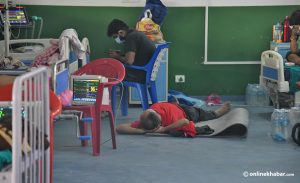Alongside the increasing coronavirus infection rate, the ‘shadow epidemic’ of gender-based violence is rising each day in Nepal. Owing to the early lockdowns, shutting down of jobs, uncertain closing of schools, confinement in houses with potential abusers, and lack of access to health and social services, the rate of violence against women has surged.
Women Rehabilitation Centre (WOREC) recorded 465 cases of violence documented just between March and May 2020 while the 24-hour toll-free helpline run by National Women’s Commission recorded 885 complaints (double of pre-Covid-19 number in the same duration) from April to June 2020.
In Nepal, the country ranking 104th out of 153 in terms of the gender gap, gendered impacts of Covid-19 have been extensive. Unpaid and care burden among women is significantly increased. Shutting down of schools has increased the pressure of child marriages. Moreover, women from marginalised communities—such as single women, women living with disabilities, women with HIV/AIDS, women involved in prostitution, and women without identity documents, and people belonging to the LGBTQIA communities—face increased problems in accessing necessary healthcare facilities. The multidimensional inequalities, dependency on informal economies, and implicit and explicit forms of biases in households and workplaces have amplified gender-based problems.
In a way, the pandemic has presented an opportune moment for the government to design responsive measures and reform the country’s system in a way that addresses underlying development needs and concerns. Considering the exacerbated levels of impacts on different vulnerable groups of society, feminist ways of responding to the pandemic are needed.
A feminist response recognises the pandemic’s unique impacts on all genders, marginalised groups, and their unique needs, acknowledges existing gender-based and social inequalities and discrimination in societies and counters them. It demands addressing all marginalised voices and securing human rights to all individuals through democratic and equitable processes. It also demands promoting and conserving indigenous values and culture and prioritises climate justice and environment-friendly measures.
Some of the feminist approaches in designing response measures that are crucial to address the structural discriminations and problems and mitigate the pandemic impacts can be:
Publication of gender data
Any data collected from the onset of the pandemic to its impact analysis should be disaggregated on the basis of gender, and an ample amount of qualitative data on gender-specific problems and impacts should be collected. Such data, called gender data, when made publicly accessible, provide evidence to the gender-specific impacts and develop a base for designing specific interventions. In such a crucial time when the virus has multidimensional impacts, real-time data must be collected with rapid gender analysis, which will serve for recovery and reformation purposes and become a reference for preparing for potential future pandemics.

Survivor-centred support mechanism to address violence against women
The feminist response shall ensure grassroots-level support systems that are centred on survivors of gender-based violence. They should be easily accessible, having digital communication options without compromising the survivors’ safety and confidentiality, and sensitive to the survivors’ emotional and mental health. A holistic reformation approach in which survivors receive timely legal and psychosocial support, employment opportunities for economic empowerment and intensive sensitisation of the community against the rampant violence is required.
Economic empowerment programmes focusing on women and minorities
In Nepal, the female unemployment rate is higher (13.1%) than that of male (10.3%) whereas women are also paid 30% less than men. Post Covid-19, unemployment has sharply increased as businesses and industries are shut down, and many migrant workers have returned home. Among returnee migrant workers, women are overrepresented in informal and unskilled labour more than men. Hence, the Covid-19 response measures must prioritise increasing employment opportunities for women and other gender minorities. They need to recognise the contributions of the paid and unpaid labour made by women to Nepal’s economic development and come up with inclusive policies and equal economic benefits.
Economic security to frontline workers
Maximum of frontline health workers globally are women (70% of the total). In Nepal, the case is no different, with gender-biased roles assuming women as fit to be nurses and care workers. As such, the recovery and reformation approach shall ensure proper recognition and acknowledgement of the frontline workers, with increased job security, benefits, and incentives to cover their loss during the pandemic. The feminist approach must ensure that there are no pay gaps based on gender, and all frontline workers shall receive adequate remuneration and formal benefits regardless of their positions.
Women’s participation in decision making
Women account for just 13.2 per cent while men account for 86.8 per cent of senior positions in Nepal, signifying just a little space for women and gender minorities in decision making. A feminist response should come from a democratic team of diverse groups of people coming from all gender groups, ethnic minorities, indigenous communities, and other marginalised groups. Institutional and execution level gaps persist which requires intensive approaches to convince the current male-dominated system about having an inclusive team and monitoring their execution thoroughly to ensure meaningful and inclusive participation.
The Supreme Court’s directive order issued on August 5 requires the Nepal government to address women’s needs on quarantine facilities, frontline health sectors, post-pandemic economic programmes, and ensure women’s participation in all Covid-19-related discussions. The challenge now lies in proper implementation. The authorities responsible for executing these orders should also develop a robust monitoring system to ensure the order is followed.

























